Detailed Analysis of Company Law Cases: Director's Responsibilities
VerifiedAdded on 2020/03/04
|14
|4103
|113
Report
AI Summary
This report provides a comprehensive analysis of company law cases, primarily focusing on the duties and responsibilities of company directors under the Australian Corporations Act 2001. The report examines the case of Cassimates, where the directors of Storm were accused of breaching their duties, specifically section 180 of the Act, by misrepresenting investment risks to shareholders. The analysis includes relevant legal provisions, such as section 180 and 945A, and explores the court's interpretation of director's obligations regarding care, diligence, and good faith. The report also addresses the application of these principles to proprietary companies, examining the roles of directors and the procedures for their removal. The report concludes that the Cassimates breached their duties and that the provisions of section 180 of the Corporation Act is applicable to the directors in general. It highlights the importance of directors acting in good faith and disclosing all risks to investors. The report also references relevant case law and legal scholars.
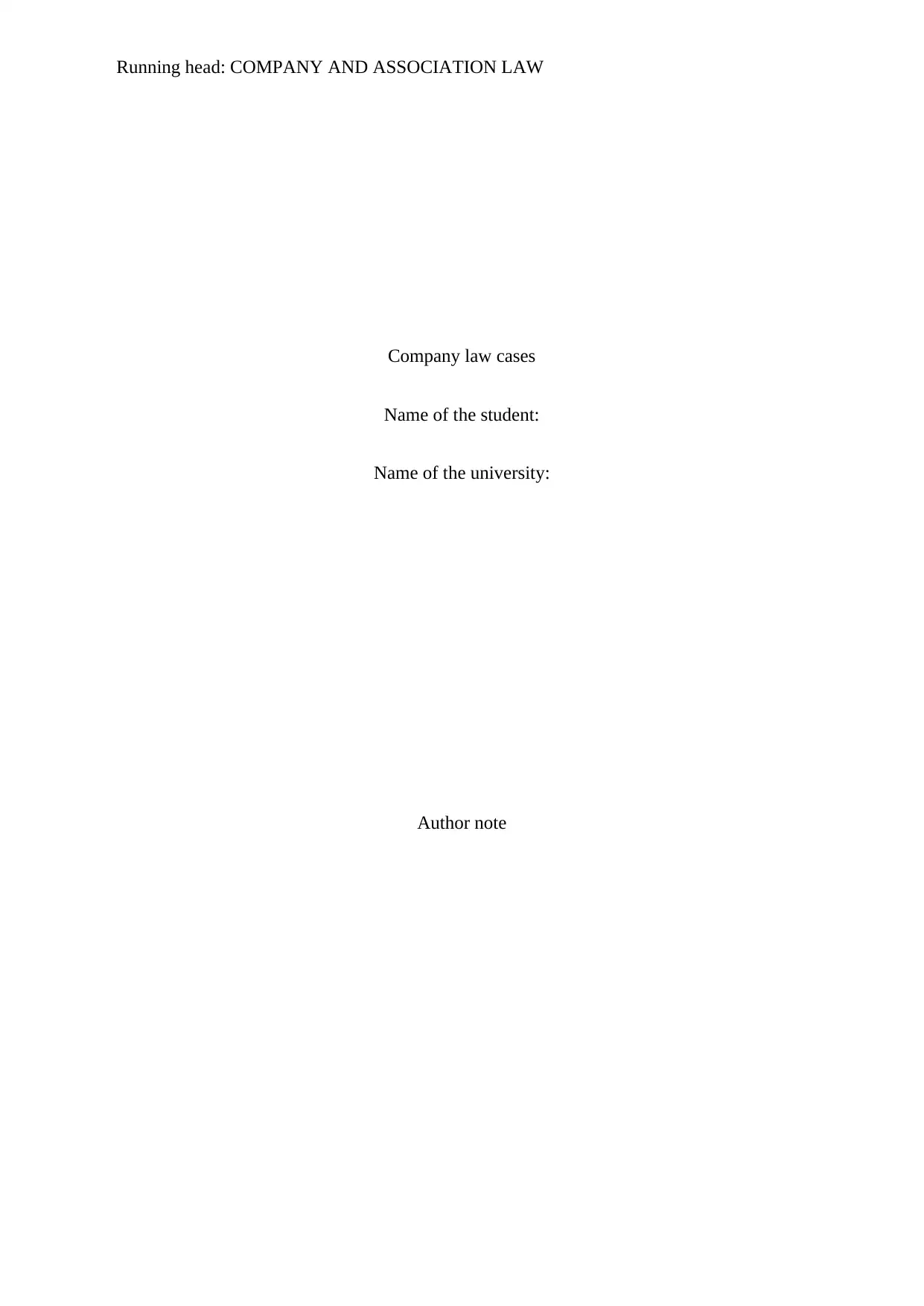
Running head: COMPANY AND ASSOCIATION LAW
Company law cases
Name of the student:
Name of the university:
Author note
Company law cases
Name of the student:
Name of the university:
Author note
Paraphrase This Document
Need a fresh take? Get an instant paraphrase of this document with our AI Paraphraser
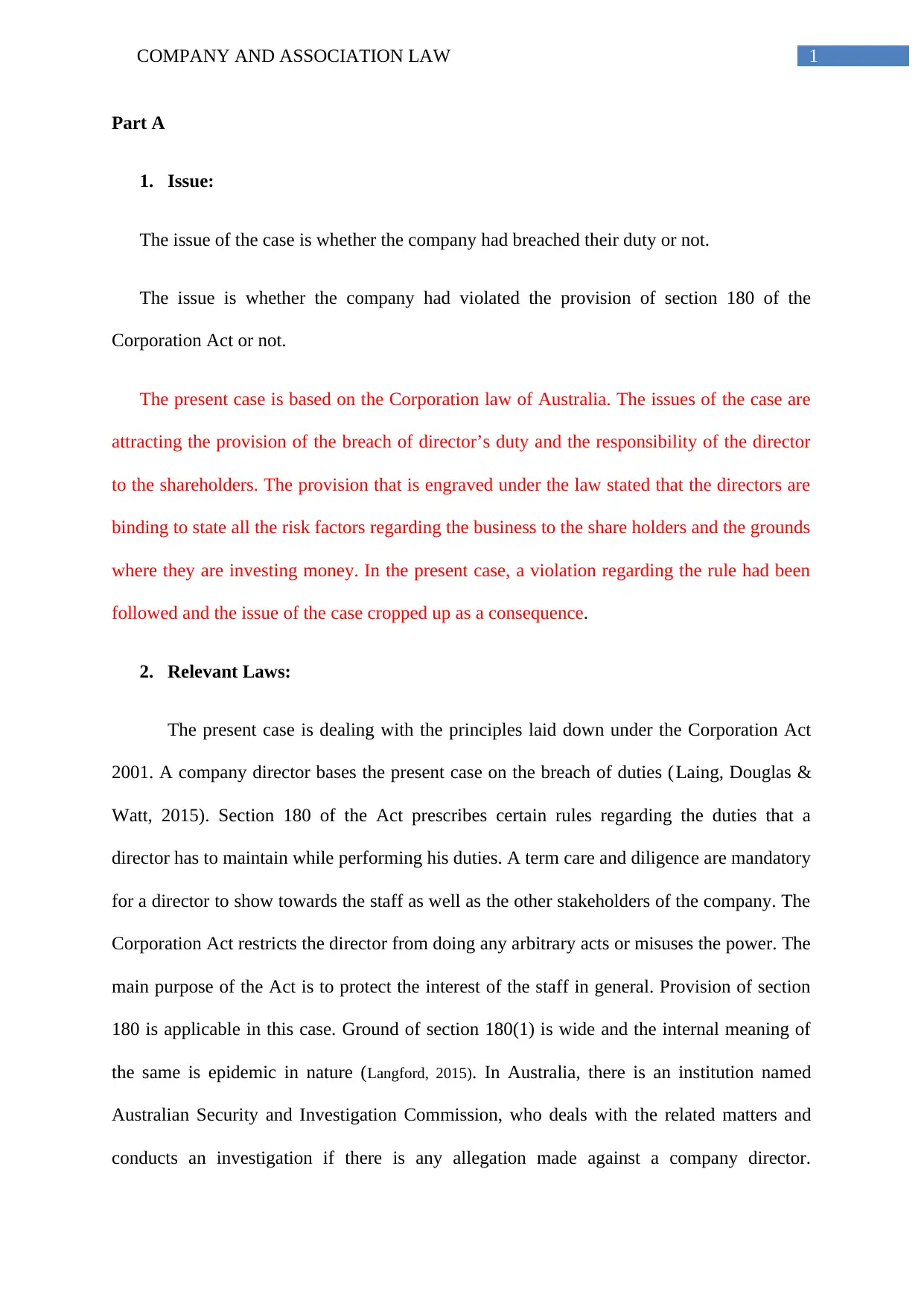
1COMPANY AND ASSOCIATION LAW
Part A
1. Issue:
The issue of the case is whether the company had breached their duty or not.
The issue is whether the company had violated the provision of section 180 of the
Corporation Act or not.
The present case is based on the Corporation law of Australia. The issues of the case are
attracting the provision of the breach of director’s duty and the responsibility of the director
to the shareholders. The provision that is engraved under the law stated that the directors are
binding to state all the risk factors regarding the business to the share holders and the grounds
where they are investing money. In the present case, a violation regarding the rule had been
followed and the issue of the case cropped up as a consequence.
2. Relevant Laws:
The present case is dealing with the principles laid down under the Corporation Act
2001. A company director bases the present case on the breach of duties (Laing, Douglas &
Watt, 2015). Section 180 of the Act prescribes certain rules regarding the duties that a
director has to maintain while performing his duties. A term care and diligence are mandatory
for a director to show towards the staff as well as the other stakeholders of the company. The
Corporation Act restricts the director from doing any arbitrary acts or misuses the power. The
main purpose of the Act is to protect the interest of the staff in general. Provision of section
180 is applicable in this case. Ground of section 180(1) is wide and the internal meaning of
the same is epidemic in nature (Langford, 2015). In Australia, there is an institution named
Australian Security and Investigation Commission, who deals with the related matters and
conducts an investigation if there is any allegation made against a company director.
Part A
1. Issue:
The issue of the case is whether the company had breached their duty or not.
The issue is whether the company had violated the provision of section 180 of the
Corporation Act or not.
The present case is based on the Corporation law of Australia. The issues of the case are
attracting the provision of the breach of director’s duty and the responsibility of the director
to the shareholders. The provision that is engraved under the law stated that the directors are
binding to state all the risk factors regarding the business to the share holders and the grounds
where they are investing money. In the present case, a violation regarding the rule had been
followed and the issue of the case cropped up as a consequence.
2. Relevant Laws:
The present case is dealing with the principles laid down under the Corporation Act
2001. A company director bases the present case on the breach of duties (Laing, Douglas &
Watt, 2015). Section 180 of the Act prescribes certain rules regarding the duties that a
director has to maintain while performing his duties. A term care and diligence are mandatory
for a director to show towards the staff as well as the other stakeholders of the company. The
Corporation Act restricts the director from doing any arbitrary acts or misuses the power. The
main purpose of the Act is to protect the interest of the staff in general. Provision of section
180 is applicable in this case. Ground of section 180(1) is wide and the internal meaning of
the same is epidemic in nature (Langford, 2015). In Australia, there is an institution named
Australian Security and Investigation Commission, who deals with the related matters and
conducts an investigation if there is any allegation made against a company director.
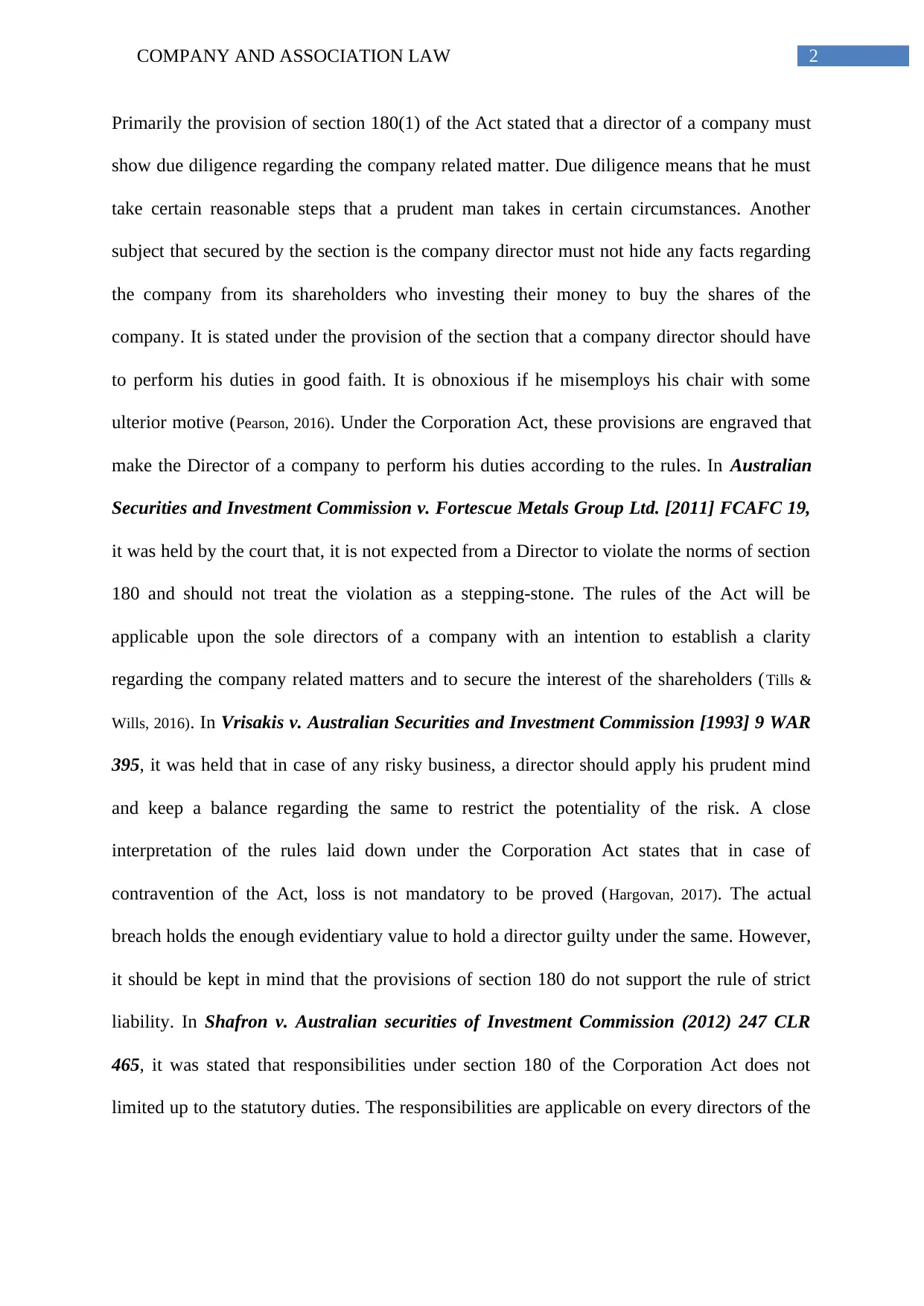
2COMPANY AND ASSOCIATION LAW
Primarily the provision of section 180(1) of the Act stated that a director of a company must
show due diligence regarding the company related matter. Due diligence means that he must
take certain reasonable steps that a prudent man takes in certain circumstances. Another
subject that secured by the section is the company director must not hide any facts regarding
the company from its shareholders who investing their money to buy the shares of the
company. It is stated under the provision of the section that a company director should have
to perform his duties in good faith. It is obnoxious if he misemploys his chair with some
ulterior motive (Pearson, 2016). Under the Corporation Act, these provisions are engraved that
make the Director of a company to perform his duties according to the rules. In Australian
Securities and Investment Commission v. Fortescue Metals Group Ltd. [2011] FCAFC 19,
it was held by the court that, it is not expected from a Director to violate the norms of section
180 and should not treat the violation as a stepping-stone. The rules of the Act will be
applicable upon the sole directors of a company with an intention to establish a clarity
regarding the company related matters and to secure the interest of the shareholders (Tills &
Wills, 2016). In Vrisakis v. Australian Securities and Investment Commission [1993] 9 WAR
395, it was held that in case of any risky business, a director should apply his prudent mind
and keep a balance regarding the same to restrict the potentiality of the risk. A close
interpretation of the rules laid down under the Corporation Act states that in case of
contravention of the Act, loss is not mandatory to be proved (Hargovan, 2017). The actual
breach holds the enough evidentiary value to hold a director guilty under the same. However,
it should be kept in mind that the provisions of section 180 do not support the rule of strict
liability. In Shafron v. Australian securities of Investment Commission (2012) 247 CLR
465, it was stated that responsibilities under section 180 of the Corporation Act does not
limited up to the statutory duties. The responsibilities are applicable on every directors of the
Primarily the provision of section 180(1) of the Act stated that a director of a company must
show due diligence regarding the company related matter. Due diligence means that he must
take certain reasonable steps that a prudent man takes in certain circumstances. Another
subject that secured by the section is the company director must not hide any facts regarding
the company from its shareholders who investing their money to buy the shares of the
company. It is stated under the provision of the section that a company director should have
to perform his duties in good faith. It is obnoxious if he misemploys his chair with some
ulterior motive (Pearson, 2016). Under the Corporation Act, these provisions are engraved that
make the Director of a company to perform his duties according to the rules. In Australian
Securities and Investment Commission v. Fortescue Metals Group Ltd. [2011] FCAFC 19,
it was held by the court that, it is not expected from a Director to violate the norms of section
180 and should not treat the violation as a stepping-stone. The rules of the Act will be
applicable upon the sole directors of a company with an intention to establish a clarity
regarding the company related matters and to secure the interest of the shareholders (Tills &
Wills, 2016). In Vrisakis v. Australian Securities and Investment Commission [1993] 9 WAR
395, it was held that in case of any risky business, a director should apply his prudent mind
and keep a balance regarding the same to restrict the potentiality of the risk. A close
interpretation of the rules laid down under the Corporation Act states that in case of
contravention of the Act, loss is not mandatory to be proved (Hargovan, 2017). The actual
breach holds the enough evidentiary value to hold a director guilty under the same. However,
it should be kept in mind that the provisions of section 180 do not support the rule of strict
liability. In Shafron v. Australian securities of Investment Commission (2012) 247 CLR
465, it was stated that responsibilities under section 180 of the Corporation Act does not
limited up to the statutory duties. The responsibilities are applicable on every directors of the
⊘ This is a preview!⊘
Do you want full access?
Subscribe today to unlock all pages.

Trusted by 1+ million students worldwide
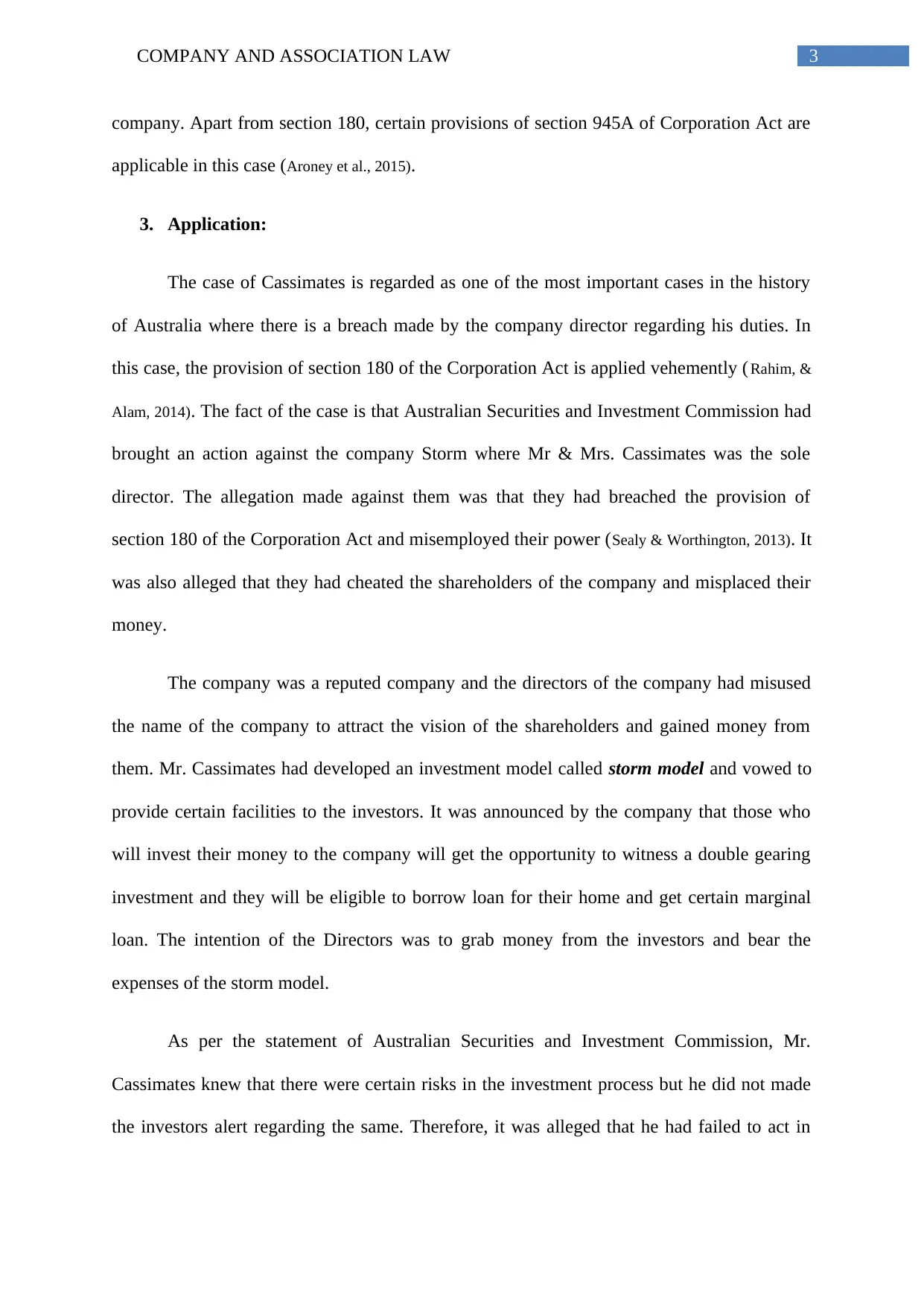
3COMPANY AND ASSOCIATION LAW
company. Apart from section 180, certain provisions of section 945A of Corporation Act are
applicable in this case (Aroney et al., 2015).
3. Application:
The case of Cassimates is regarded as one of the most important cases in the history
of Australia where there is a breach made by the company director regarding his duties. In
this case, the provision of section 180 of the Corporation Act is applied vehemently ( Rahim, &
Alam, 2014). The fact of the case is that Australian Securities and Investment Commission had
brought an action against the company Storm where Mr & Mrs. Cassimates was the sole
director. The allegation made against them was that they had breached the provision of
section 180 of the Corporation Act and misemployed their power (Sealy & Worthington, 2013). It
was also alleged that they had cheated the shareholders of the company and misplaced their
money.
The company was a reputed company and the directors of the company had misused
the name of the company to attract the vision of the shareholders and gained money from
them. Mr. Cassimates had developed an investment model called storm model and vowed to
provide certain facilities to the investors. It was announced by the company that those who
will invest their money to the company will get the opportunity to witness a double gearing
investment and they will be eligible to borrow loan for their home and get certain marginal
loan. The intention of the Directors was to grab money from the investors and bear the
expenses of the storm model.
As per the statement of Australian Securities and Investment Commission, Mr.
Cassimates knew that there were certain risks in the investment process but he did not made
the investors alert regarding the same. Therefore, it was alleged that he had failed to act in
company. Apart from section 180, certain provisions of section 945A of Corporation Act are
applicable in this case (Aroney et al., 2015).
3. Application:
The case of Cassimates is regarded as one of the most important cases in the history
of Australia where there is a breach made by the company director regarding his duties. In
this case, the provision of section 180 of the Corporation Act is applied vehemently ( Rahim, &
Alam, 2014). The fact of the case is that Australian Securities and Investment Commission had
brought an action against the company Storm where Mr & Mrs. Cassimates was the sole
director. The allegation made against them was that they had breached the provision of
section 180 of the Corporation Act and misemployed their power (Sealy & Worthington, 2013). It
was also alleged that they had cheated the shareholders of the company and misplaced their
money.
The company was a reputed company and the directors of the company had misused
the name of the company to attract the vision of the shareholders and gained money from
them. Mr. Cassimates had developed an investment model called storm model and vowed to
provide certain facilities to the investors. It was announced by the company that those who
will invest their money to the company will get the opportunity to witness a double gearing
investment and they will be eligible to borrow loan for their home and get certain marginal
loan. The intention of the Directors was to grab money from the investors and bear the
expenses of the storm model.
As per the statement of Australian Securities and Investment Commission, Mr.
Cassimates knew that there were certain risks in the investment process but he did not made
the investors alert regarding the same. Therefore, it was alleged that he had failed to act in
Paraphrase This Document
Need a fresh take? Get an instant paraphrase of this document with our AI Paraphraser
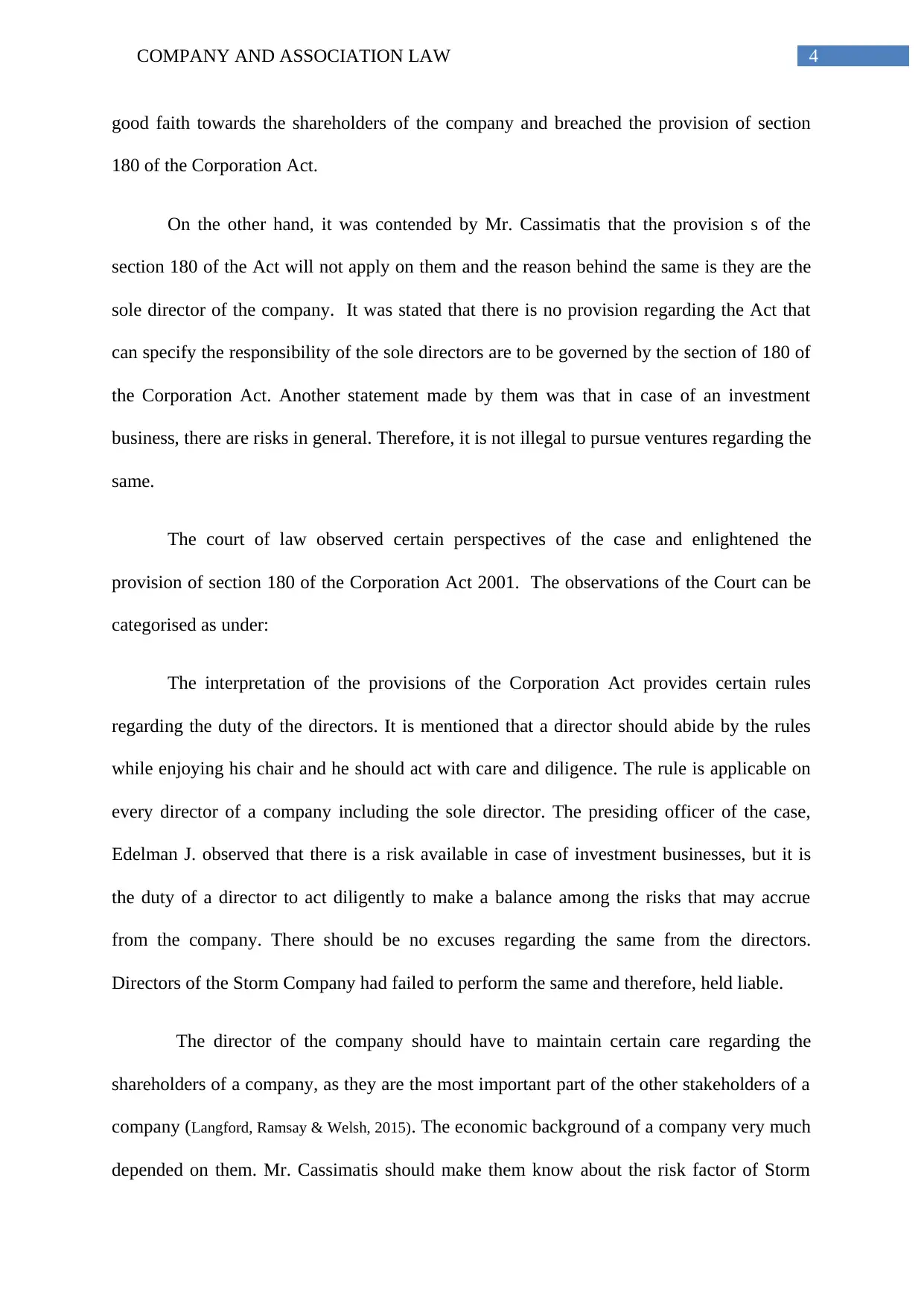
4COMPANY AND ASSOCIATION LAW
good faith towards the shareholders of the company and breached the provision of section
180 of the Corporation Act.
On the other hand, it was contended by Mr. Cassimatis that the provision s of the
section 180 of the Act will not apply on them and the reason behind the same is they are the
sole director of the company. It was stated that there is no provision regarding the Act that
can specify the responsibility of the sole directors are to be governed by the section of 180 of
the Corporation Act. Another statement made by them was that in case of an investment
business, there are risks in general. Therefore, it is not illegal to pursue ventures regarding the
same.
The court of law observed certain perspectives of the case and enlightened the
provision of section 180 of the Corporation Act 2001. The observations of the Court can be
categorised as under:
The interpretation of the provisions of the Corporation Act provides certain rules
regarding the duty of the directors. It is mentioned that a director should abide by the rules
while enjoying his chair and he should act with care and diligence. The rule is applicable on
every director of a company including the sole director. The presiding officer of the case,
Edelman J. observed that there is a risk available in case of investment businesses, but it is
the duty of a director to act diligently to make a balance among the risks that may accrue
from the company. There should be no excuses regarding the same from the directors.
Directors of the Storm Company had failed to perform the same and therefore, held liable.
The director of the company should have to maintain certain care regarding the
shareholders of a company, as they are the most important part of the other stakeholders of a
company (Langford, Ramsay & Welsh, 2015). The economic background of a company very much
depended on them. Mr. Cassimatis should make them know about the risk factor of Storm
good faith towards the shareholders of the company and breached the provision of section
180 of the Corporation Act.
On the other hand, it was contended by Mr. Cassimatis that the provision s of the
section 180 of the Act will not apply on them and the reason behind the same is they are the
sole director of the company. It was stated that there is no provision regarding the Act that
can specify the responsibility of the sole directors are to be governed by the section of 180 of
the Corporation Act. Another statement made by them was that in case of an investment
business, there are risks in general. Therefore, it is not illegal to pursue ventures regarding the
same.
The court of law observed certain perspectives of the case and enlightened the
provision of section 180 of the Corporation Act 2001. The observations of the Court can be
categorised as under:
The interpretation of the provisions of the Corporation Act provides certain rules
regarding the duty of the directors. It is mentioned that a director should abide by the rules
while enjoying his chair and he should act with care and diligence. The rule is applicable on
every director of a company including the sole director. The presiding officer of the case,
Edelman J. observed that there is a risk available in case of investment businesses, but it is
the duty of a director to act diligently to make a balance among the risks that may accrue
from the company. There should be no excuses regarding the same from the directors.
Directors of the Storm Company had failed to perform the same and therefore, held liable.
The director of the company should have to maintain certain care regarding the
shareholders of a company, as they are the most important part of the other stakeholders of a
company (Langford, Ramsay & Welsh, 2015). The economic background of a company very much
depended on them. Mr. Cassimatis should make them know about the risk factor of Storm
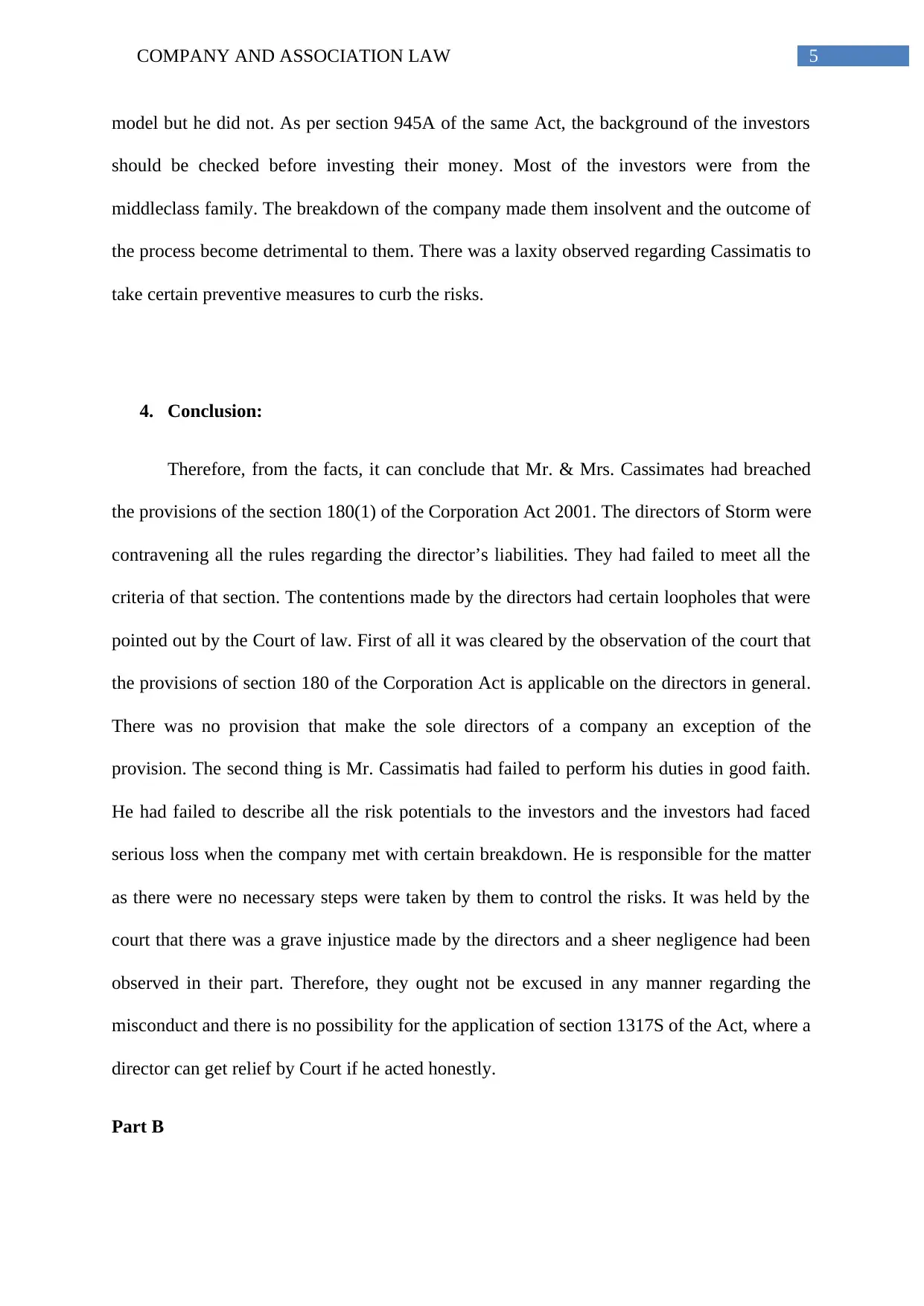
5COMPANY AND ASSOCIATION LAW
model but he did not. As per section 945A of the same Act, the background of the investors
should be checked before investing their money. Most of the investors were from the
middleclass family. The breakdown of the company made them insolvent and the outcome of
the process become detrimental to them. There was a laxity observed regarding Cassimatis to
take certain preventive measures to curb the risks.
4. Conclusion:
Therefore, from the facts, it can conclude that Mr. & Mrs. Cassimates had breached
the provisions of the section 180(1) of the Corporation Act 2001. The directors of Storm were
contravening all the rules regarding the director’s liabilities. They had failed to meet all the
criteria of that section. The contentions made by the directors had certain loopholes that were
pointed out by the Court of law. First of all it was cleared by the observation of the court that
the provisions of section 180 of the Corporation Act is applicable on the directors in general.
There was no provision that make the sole directors of a company an exception of the
provision. The second thing is Mr. Cassimatis had failed to perform his duties in good faith.
He had failed to describe all the risk potentials to the investors and the investors had faced
serious loss when the company met with certain breakdown. He is responsible for the matter
as there were no necessary steps were taken by them to control the risks. It was held by the
court that there was a grave injustice made by the directors and a sheer negligence had been
observed in their part. Therefore, they ought not be excused in any manner regarding the
misconduct and there is no possibility for the application of section 1317S of the Act, where a
director can get relief by Court if he acted honestly.
Part B
model but he did not. As per section 945A of the same Act, the background of the investors
should be checked before investing their money. Most of the investors were from the
middleclass family. The breakdown of the company made them insolvent and the outcome of
the process become detrimental to them. There was a laxity observed regarding Cassimatis to
take certain preventive measures to curb the risks.
4. Conclusion:
Therefore, from the facts, it can conclude that Mr. & Mrs. Cassimates had breached
the provisions of the section 180(1) of the Corporation Act 2001. The directors of Storm were
contravening all the rules regarding the director’s liabilities. They had failed to meet all the
criteria of that section. The contentions made by the directors had certain loopholes that were
pointed out by the Court of law. First of all it was cleared by the observation of the court that
the provisions of section 180 of the Corporation Act is applicable on the directors in general.
There was no provision that make the sole directors of a company an exception of the
provision. The second thing is Mr. Cassimatis had failed to perform his duties in good faith.
He had failed to describe all the risk potentials to the investors and the investors had faced
serious loss when the company met with certain breakdown. He is responsible for the matter
as there were no necessary steps were taken by them to control the risks. It was held by the
court that there was a grave injustice made by the directors and a sheer negligence had been
observed in their part. Therefore, they ought not be excused in any manner regarding the
misconduct and there is no possibility for the application of section 1317S of the Act, where a
director can get relief by Court if he acted honestly.
Part B
⊘ This is a preview!⊘
Do you want full access?
Subscribe today to unlock all pages.

Trusted by 1+ million students worldwide
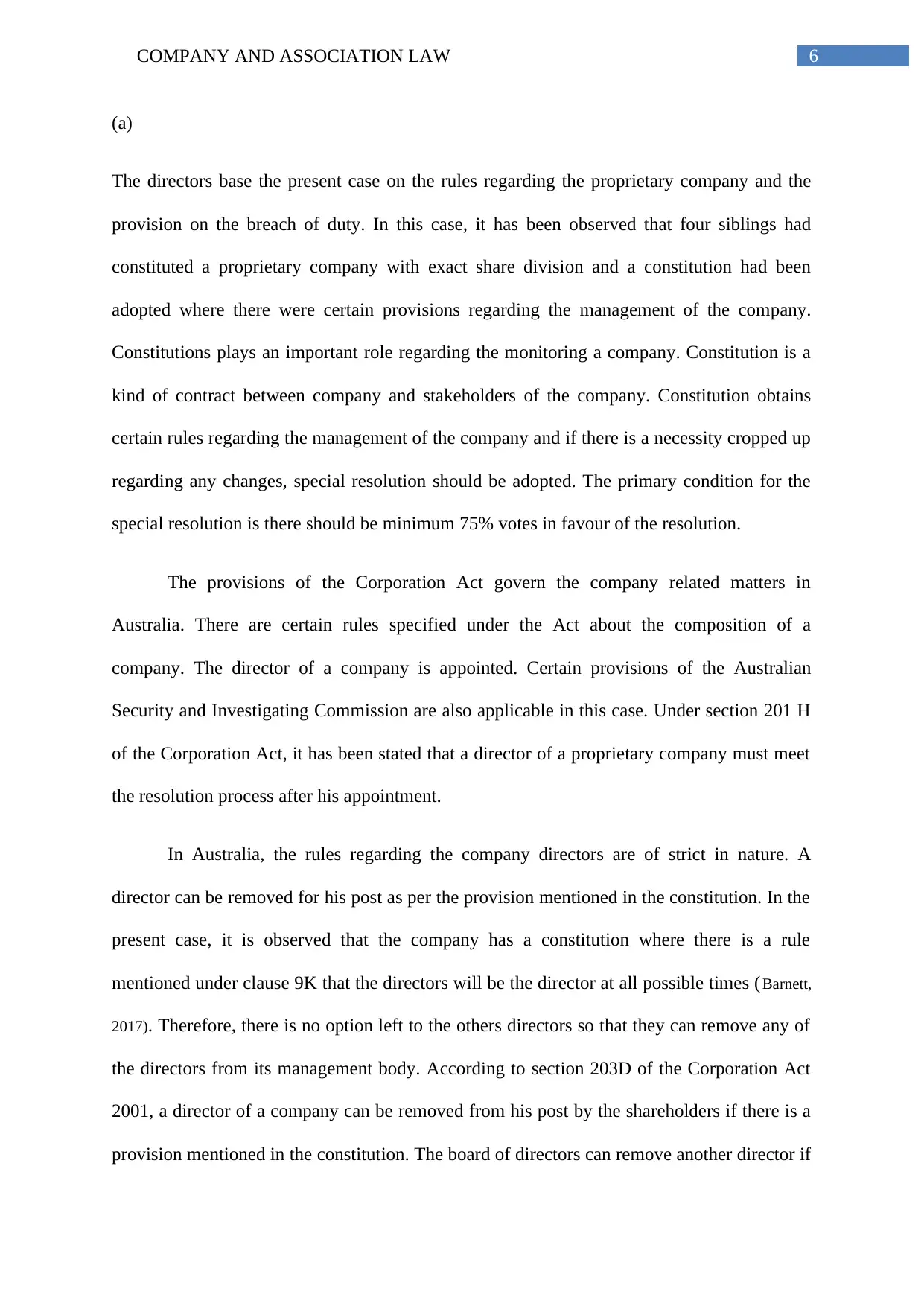
6COMPANY AND ASSOCIATION LAW
(a)
The directors base the present case on the rules regarding the proprietary company and the
provision on the breach of duty. In this case, it has been observed that four siblings had
constituted a proprietary company with exact share division and a constitution had been
adopted where there were certain provisions regarding the management of the company.
Constitutions plays an important role regarding the monitoring a company. Constitution is a
kind of contract between company and stakeholders of the company. Constitution obtains
certain rules regarding the management of the company and if there is a necessity cropped up
regarding any changes, special resolution should be adopted. The primary condition for the
special resolution is there should be minimum 75% votes in favour of the resolution.
The provisions of the Corporation Act govern the company related matters in
Australia. There are certain rules specified under the Act about the composition of a
company. The director of a company is appointed. Certain provisions of the Australian
Security and Investigating Commission are also applicable in this case. Under section 201 H
of the Corporation Act, it has been stated that a director of a proprietary company must meet
the resolution process after his appointment.
In Australia, the rules regarding the company directors are of strict in nature. A
director can be removed for his post as per the provision mentioned in the constitution. In the
present case, it is observed that the company has a constitution where there is a rule
mentioned under clause 9K that the directors will be the director at all possible times (Barnett,
2017). Therefore, there is no option left to the others directors so that they can remove any of
the directors from its management body. According to section 203D of the Corporation Act
2001, a director of a company can be removed from his post by the shareholders if there is a
provision mentioned in the constitution. The board of directors can remove another director if
(a)
The directors base the present case on the rules regarding the proprietary company and the
provision on the breach of duty. In this case, it has been observed that four siblings had
constituted a proprietary company with exact share division and a constitution had been
adopted where there were certain provisions regarding the management of the company.
Constitutions plays an important role regarding the monitoring a company. Constitution is a
kind of contract between company and stakeholders of the company. Constitution obtains
certain rules regarding the management of the company and if there is a necessity cropped up
regarding any changes, special resolution should be adopted. The primary condition for the
special resolution is there should be minimum 75% votes in favour of the resolution.
The provisions of the Corporation Act govern the company related matters in
Australia. There are certain rules specified under the Act about the composition of a
company. The director of a company is appointed. Certain provisions of the Australian
Security and Investigating Commission are also applicable in this case. Under section 201 H
of the Corporation Act, it has been stated that a director of a proprietary company must meet
the resolution process after his appointment.
In Australia, the rules regarding the company directors are of strict in nature. A
director can be removed for his post as per the provision mentioned in the constitution. In the
present case, it is observed that the company has a constitution where there is a rule
mentioned under clause 9K that the directors will be the director at all possible times (Barnett,
2017). Therefore, there is no option left to the others directors so that they can remove any of
the directors from its management body. According to section 203D of the Corporation Act
2001, a director of a company can be removed from his post by the shareholders if there is a
provision mentioned in the constitution. The board of directors can remove another director if
Paraphrase This Document
Need a fresh take? Get an instant paraphrase of this document with our AI Paraphraser
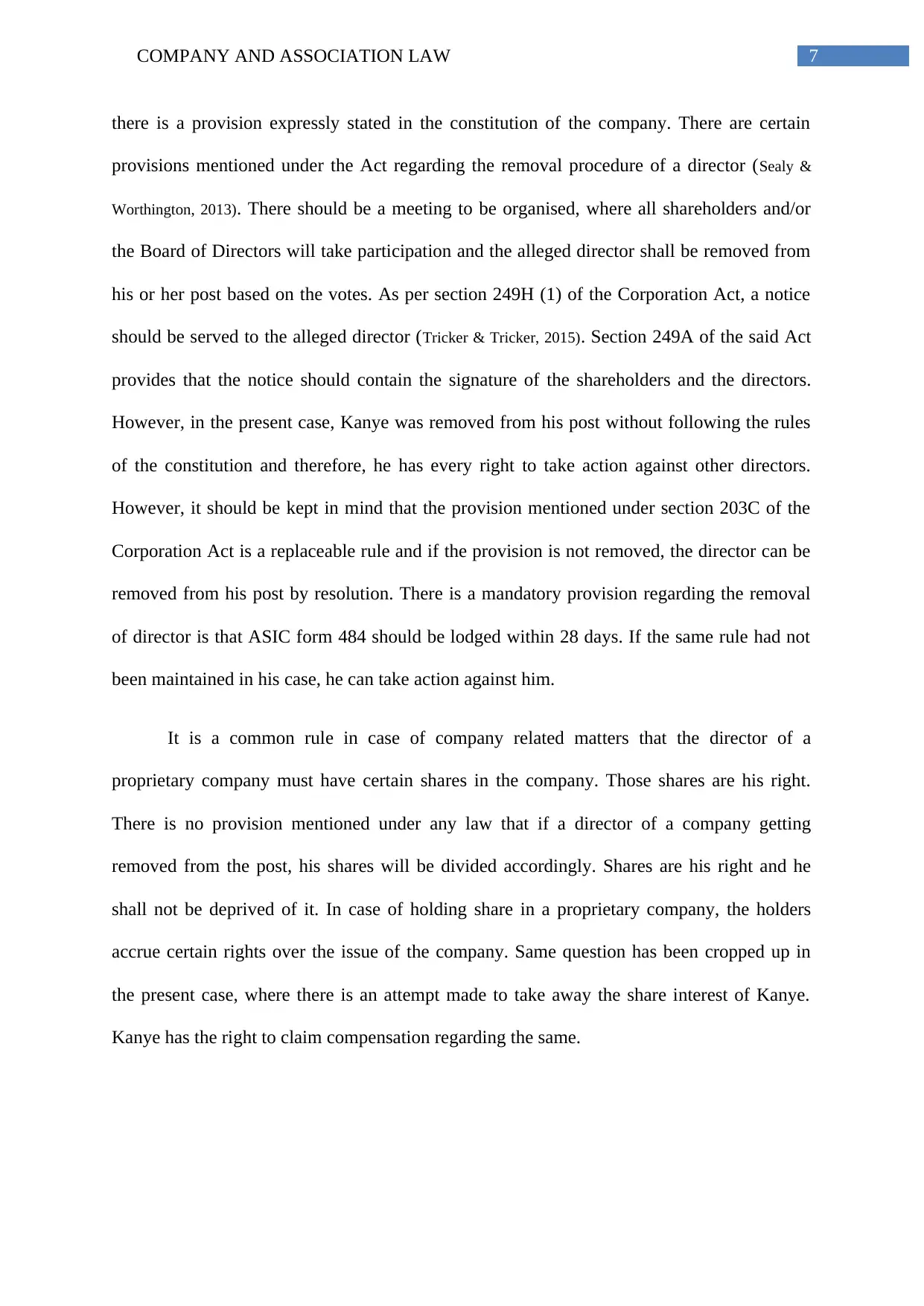
7COMPANY AND ASSOCIATION LAW
there is a provision expressly stated in the constitution of the company. There are certain
provisions mentioned under the Act regarding the removal procedure of a director (Sealy &
Worthington, 2013). There should be a meeting to be organised, where all shareholders and/or
the Board of Directors will take participation and the alleged director shall be removed from
his or her post based on the votes. As per section 249H (1) of the Corporation Act, a notice
should be served to the alleged director (Tricker & Tricker, 2015). Section 249A of the said Act
provides that the notice should contain the signature of the shareholders and the directors.
However, in the present case, Kanye was removed from his post without following the rules
of the constitution and therefore, he has every right to take action against other directors.
However, it should be kept in mind that the provision mentioned under section 203C of the
Corporation Act is a replaceable rule and if the provision is not removed, the director can be
removed from his post by resolution. There is a mandatory provision regarding the removal
of director is that ASIC form 484 should be lodged within 28 days. If the same rule had not
been maintained in his case, he can take action against him.
It is a common rule in case of company related matters that the director of a
proprietary company must have certain shares in the company. Those shares are his right.
There is no provision mentioned under any law that if a director of a company getting
removed from the post, his shares will be divided accordingly. Shares are his right and he
shall not be deprived of it. In case of holding share in a proprietary company, the holders
accrue certain rights over the issue of the company. Same question has been cropped up in
the present case, where there is an attempt made to take away the share interest of Kanye.
Kanye has the right to claim compensation regarding the same.
there is a provision expressly stated in the constitution of the company. There are certain
provisions mentioned under the Act regarding the removal procedure of a director (Sealy &
Worthington, 2013). There should be a meeting to be organised, where all shareholders and/or
the Board of Directors will take participation and the alleged director shall be removed from
his or her post based on the votes. As per section 249H (1) of the Corporation Act, a notice
should be served to the alleged director (Tricker & Tricker, 2015). Section 249A of the said Act
provides that the notice should contain the signature of the shareholders and the directors.
However, in the present case, Kanye was removed from his post without following the rules
of the constitution and therefore, he has every right to take action against other directors.
However, it should be kept in mind that the provision mentioned under section 203C of the
Corporation Act is a replaceable rule and if the provision is not removed, the director can be
removed from his post by resolution. There is a mandatory provision regarding the removal
of director is that ASIC form 484 should be lodged within 28 days. If the same rule had not
been maintained in his case, he can take action against him.
It is a common rule in case of company related matters that the director of a
proprietary company must have certain shares in the company. Those shares are his right.
There is no provision mentioned under any law that if a director of a company getting
removed from the post, his shares will be divided accordingly. Shares are his right and he
shall not be deprived of it. In case of holding share in a proprietary company, the holders
accrue certain rights over the issue of the company. Same question has been cropped up in
the present case, where there is an attempt made to take away the share interest of Kanye.
Kanye has the right to claim compensation regarding the same.
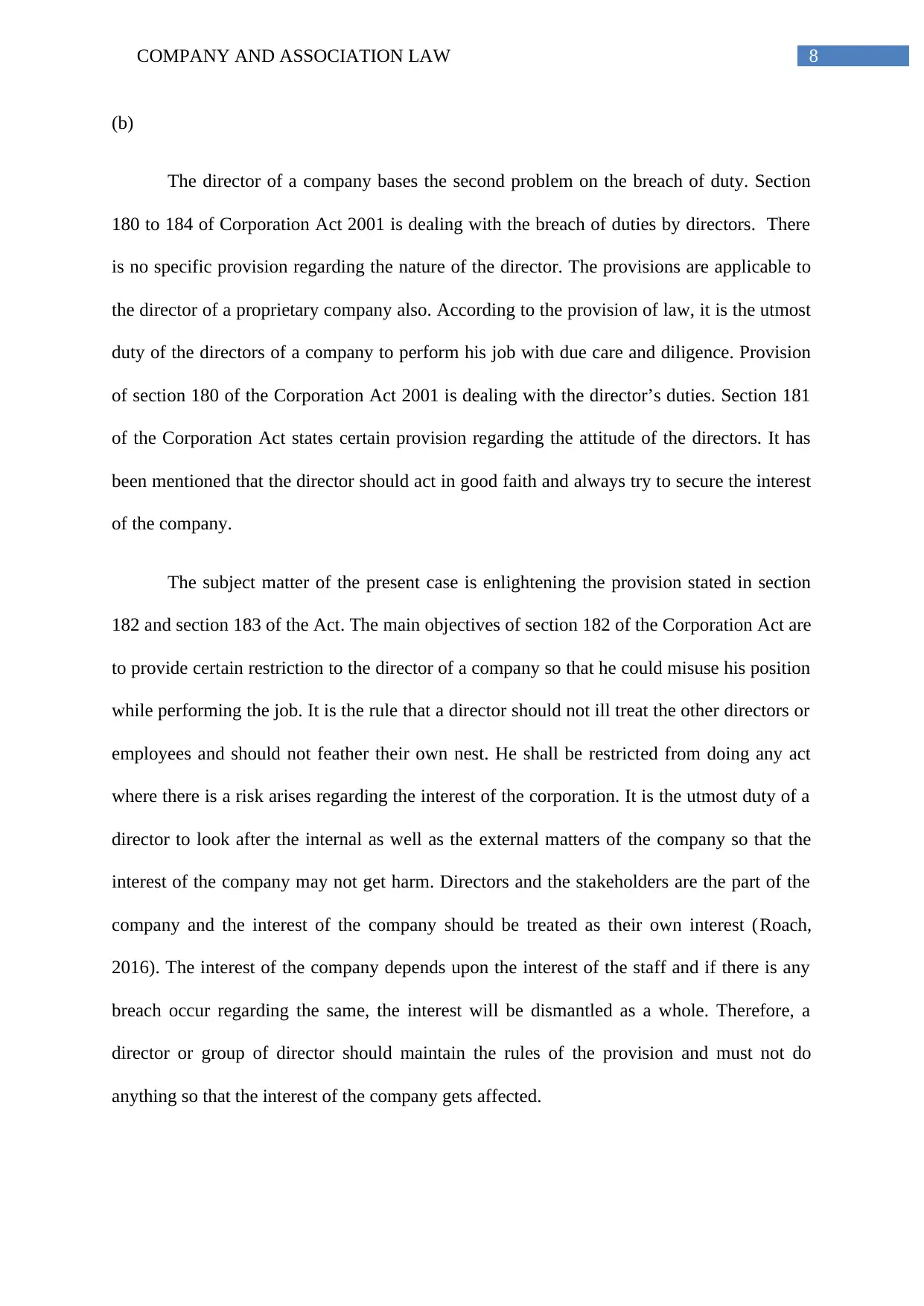
8COMPANY AND ASSOCIATION LAW
(b)
The director of a company bases the second problem on the breach of duty. Section
180 to 184 of Corporation Act 2001 is dealing with the breach of duties by directors. There
is no specific provision regarding the nature of the director. The provisions are applicable to
the director of a proprietary company also. According to the provision of law, it is the utmost
duty of the directors of a company to perform his job with due care and diligence. Provision
of section 180 of the Corporation Act 2001 is dealing with the director’s duties. Section 181
of the Corporation Act states certain provision regarding the attitude of the directors. It has
been mentioned that the director should act in good faith and always try to secure the interest
of the company.
The subject matter of the present case is enlightening the provision stated in section
182 and section 183 of the Act. The main objectives of section 182 of the Corporation Act are
to provide certain restriction to the director of a company so that he could misuse his position
while performing the job. It is the rule that a director should not ill treat the other directors or
employees and should not feather their own nest. He shall be restricted from doing any act
where there is a risk arises regarding the interest of the corporation. It is the utmost duty of a
director to look after the internal as well as the external matters of the company so that the
interest of the company may not get harm. Directors and the stakeholders are the part of the
company and the interest of the company should be treated as their own interest (Roach,
2016). The interest of the company depends upon the interest of the staff and if there is any
breach occur regarding the same, the interest will be dismantled as a whole. Therefore, a
director or group of director should maintain the rules of the provision and must not do
anything so that the interest of the company gets affected.
(b)
The director of a company bases the second problem on the breach of duty. Section
180 to 184 of Corporation Act 2001 is dealing with the breach of duties by directors. There
is no specific provision regarding the nature of the director. The provisions are applicable to
the director of a proprietary company also. According to the provision of law, it is the utmost
duty of the directors of a company to perform his job with due care and diligence. Provision
of section 180 of the Corporation Act 2001 is dealing with the director’s duties. Section 181
of the Corporation Act states certain provision regarding the attitude of the directors. It has
been mentioned that the director should act in good faith and always try to secure the interest
of the company.
The subject matter of the present case is enlightening the provision stated in section
182 and section 183 of the Act. The main objectives of section 182 of the Corporation Act are
to provide certain restriction to the director of a company so that he could misuse his position
while performing the job. It is the rule that a director should not ill treat the other directors or
employees and should not feather their own nest. He shall be restricted from doing any act
where there is a risk arises regarding the interest of the corporation. It is the utmost duty of a
director to look after the internal as well as the external matters of the company so that the
interest of the company may not get harm. Directors and the stakeholders are the part of the
company and the interest of the company should be treated as their own interest (Roach,
2016). The interest of the company depends upon the interest of the staff and if there is any
breach occur regarding the same, the interest will be dismantled as a whole. Therefore, a
director or group of director should maintain the rules of the provision and must not do
anything so that the interest of the company gets affected.
⊘ This is a preview!⊘
Do you want full access?
Subscribe today to unlock all pages.

Trusted by 1+ million students worldwide
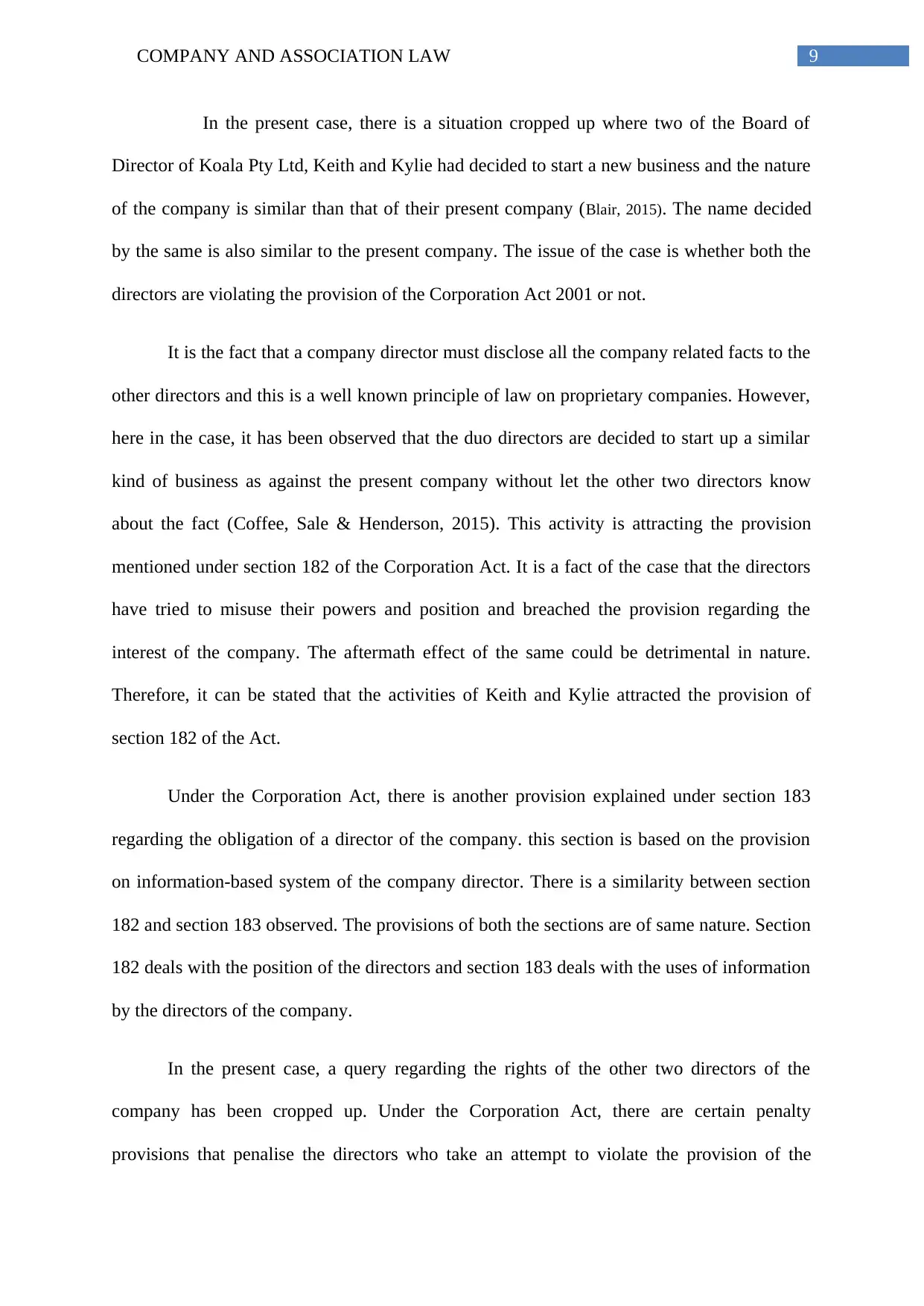
9COMPANY AND ASSOCIATION LAW
In the present case, there is a situation cropped up where two of the Board of
Director of Koala Pty Ltd, Keith and Kylie had decided to start a new business and the nature
of the company is similar than that of their present company (Blair, 2015). The name decided
by the same is also similar to the present company. The issue of the case is whether both the
directors are violating the provision of the Corporation Act 2001 or not.
It is the fact that a company director must disclose all the company related facts to the
other directors and this is a well known principle of law on proprietary companies. However,
here in the case, it has been observed that the duo directors are decided to start up a similar
kind of business as against the present company without let the other two directors know
about the fact (Coffee, Sale & Henderson, 2015). This activity is attracting the provision
mentioned under section 182 of the Corporation Act. It is a fact of the case that the directors
have tried to misuse their powers and position and breached the provision regarding the
interest of the company. The aftermath effect of the same could be detrimental in nature.
Therefore, it can be stated that the activities of Keith and Kylie attracted the provision of
section 182 of the Act.
Under the Corporation Act, there is another provision explained under section 183
regarding the obligation of a director of the company. this section is based on the provision
on information-based system of the company director. There is a similarity between section
182 and section 183 observed. The provisions of both the sections are of same nature. Section
182 deals with the position of the directors and section 183 deals with the uses of information
by the directors of the company.
In the present case, a query regarding the rights of the other two directors of the
company has been cropped up. Under the Corporation Act, there are certain penalty
provisions that penalise the directors who take an attempt to violate the provision of the
In the present case, there is a situation cropped up where two of the Board of
Director of Koala Pty Ltd, Keith and Kylie had decided to start a new business and the nature
of the company is similar than that of their present company (Blair, 2015). The name decided
by the same is also similar to the present company. The issue of the case is whether both the
directors are violating the provision of the Corporation Act 2001 or not.
It is the fact that a company director must disclose all the company related facts to the
other directors and this is a well known principle of law on proprietary companies. However,
here in the case, it has been observed that the duo directors are decided to start up a similar
kind of business as against the present company without let the other two directors know
about the fact (Coffee, Sale & Henderson, 2015). This activity is attracting the provision
mentioned under section 182 of the Corporation Act. It is a fact of the case that the directors
have tried to misuse their powers and position and breached the provision regarding the
interest of the company. The aftermath effect of the same could be detrimental in nature.
Therefore, it can be stated that the activities of Keith and Kylie attracted the provision of
section 182 of the Act.
Under the Corporation Act, there is another provision explained under section 183
regarding the obligation of a director of the company. this section is based on the provision
on information-based system of the company director. There is a similarity between section
182 and section 183 observed. The provisions of both the sections are of same nature. Section
182 deals with the position of the directors and section 183 deals with the uses of information
by the directors of the company.
In the present case, a query regarding the rights of the other two directors of the
company has been cropped up. Under the Corporation Act, there are certain penalty
provisions that penalise the directors who take an attempt to violate the provision of the
Paraphrase This Document
Need a fresh take? Get an instant paraphrase of this document with our AI Paraphraser
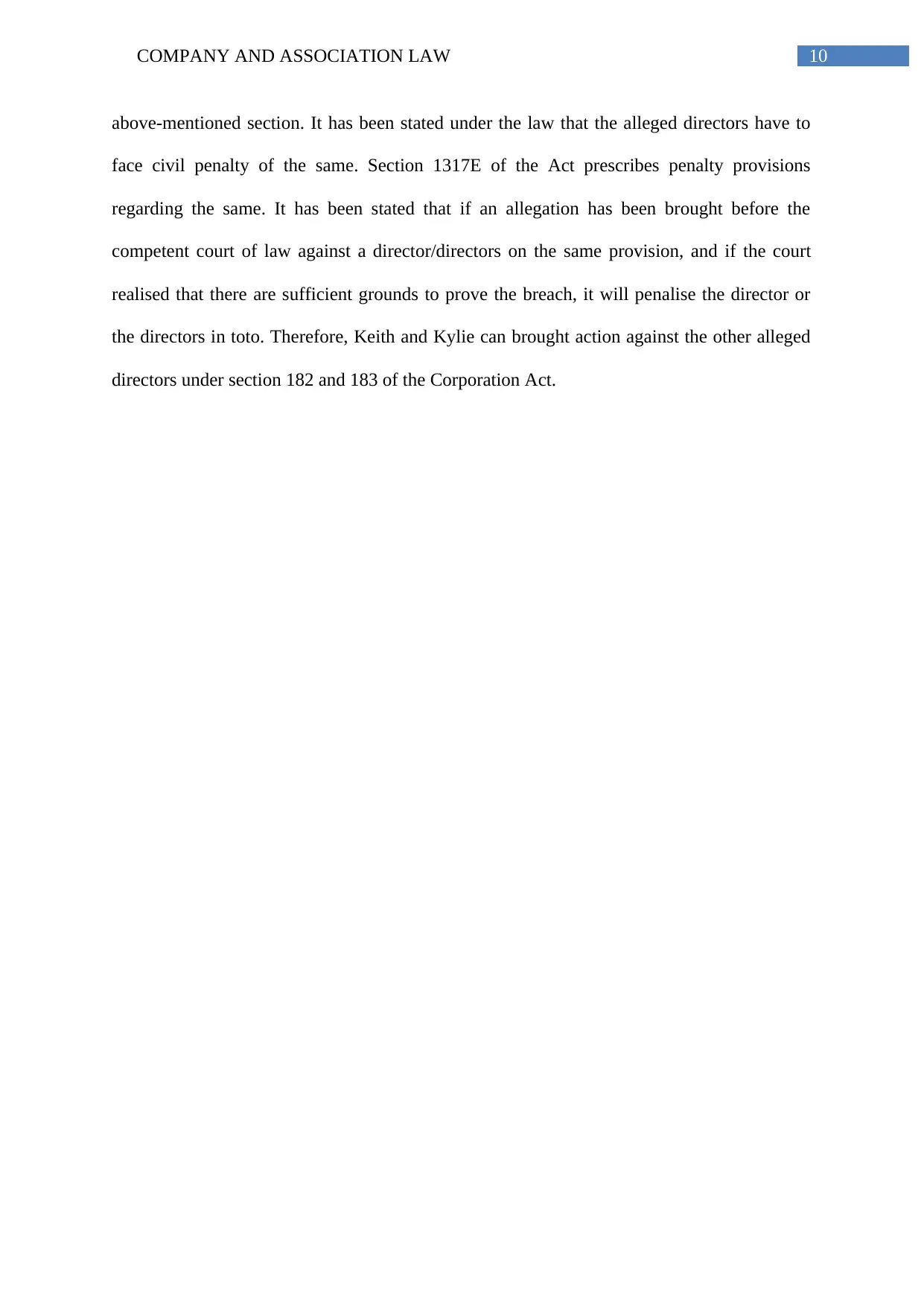
10COMPANY AND ASSOCIATION LAW
above-mentioned section. It has been stated under the law that the alleged directors have to
face civil penalty of the same. Section 1317E of the Act prescribes penalty provisions
regarding the same. It has been stated that if an allegation has been brought before the
competent court of law against a director/directors on the same provision, and if the court
realised that there are sufficient grounds to prove the breach, it will penalise the director or
the directors in toto. Therefore, Keith and Kylie can brought action against the other alleged
directors under section 182 and 183 of the Corporation Act.
above-mentioned section. It has been stated under the law that the alleged directors have to
face civil penalty of the same. Section 1317E of the Act prescribes penalty provisions
regarding the same. It has been stated that if an allegation has been brought before the
competent court of law against a director/directors on the same provision, and if the court
realised that there are sufficient grounds to prove the breach, it will penalise the director or
the directors in toto. Therefore, Keith and Kylie can brought action against the other alleged
directors under section 182 and 183 of the Corporation Act.
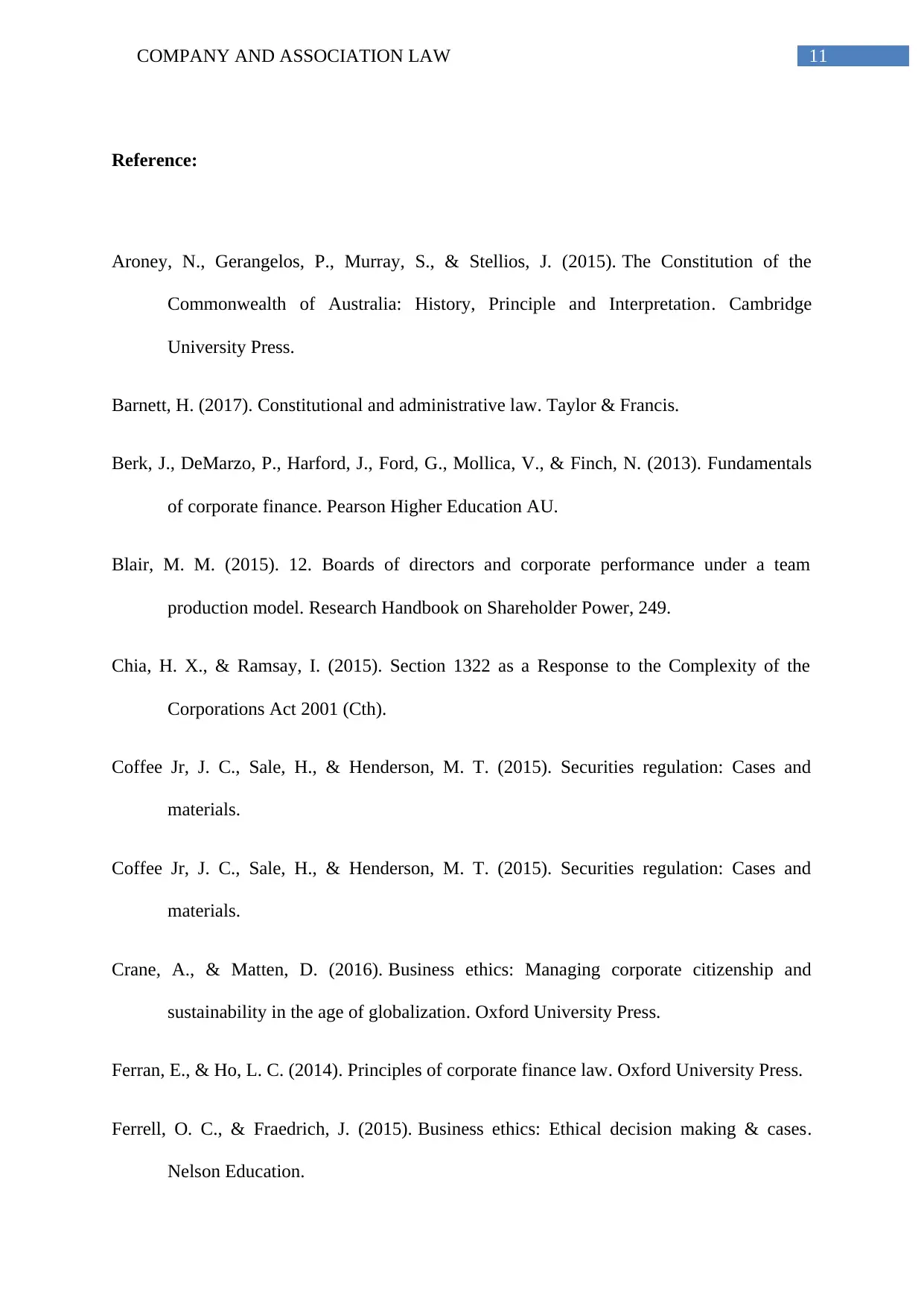
11COMPANY AND ASSOCIATION LAW
Reference:
Aroney, N., Gerangelos, P., Murray, S., & Stellios, J. (2015). The Constitution of the
Commonwealth of Australia: History, Principle and Interpretation. Cambridge
University Press.
Barnett, H. (2017). Constitutional and administrative law. Taylor & Francis.
Berk, J., DeMarzo, P., Harford, J., Ford, G., Mollica, V., & Finch, N. (2013). Fundamentals
of corporate finance. Pearson Higher Education AU.
Blair, M. M. (2015). 12. Boards of directors and corporate performance under a team
production model. Research Handbook on Shareholder Power, 249.
Chia, H. X., & Ramsay, I. (2015). Section 1322 as a Response to the Complexity of the
Corporations Act 2001 (Cth).
Coffee Jr, J. C., Sale, H., & Henderson, M. T. (2015). Securities regulation: Cases and
materials.
Coffee Jr, J. C., Sale, H., & Henderson, M. T. (2015). Securities regulation: Cases and
materials.
Crane, A., & Matten, D. (2016). Business ethics: Managing corporate citizenship and
sustainability in the age of globalization. Oxford University Press.
Ferran, E., & Ho, L. C. (2014). Principles of corporate finance law. Oxford University Press.
Ferrell, O. C., & Fraedrich, J. (2015). Business ethics: Ethical decision making & cases.
Nelson Education.
Reference:
Aroney, N., Gerangelos, P., Murray, S., & Stellios, J. (2015). The Constitution of the
Commonwealth of Australia: History, Principle and Interpretation. Cambridge
University Press.
Barnett, H. (2017). Constitutional and administrative law. Taylor & Francis.
Berk, J., DeMarzo, P., Harford, J., Ford, G., Mollica, V., & Finch, N. (2013). Fundamentals
of corporate finance. Pearson Higher Education AU.
Blair, M. M. (2015). 12. Boards of directors and corporate performance under a team
production model. Research Handbook on Shareholder Power, 249.
Chia, H. X., & Ramsay, I. (2015). Section 1322 as a Response to the Complexity of the
Corporations Act 2001 (Cth).
Coffee Jr, J. C., Sale, H., & Henderson, M. T. (2015). Securities regulation: Cases and
materials.
Coffee Jr, J. C., Sale, H., & Henderson, M. T. (2015). Securities regulation: Cases and
materials.
Crane, A., & Matten, D. (2016). Business ethics: Managing corporate citizenship and
sustainability in the age of globalization. Oxford University Press.
Ferran, E., & Ho, L. C. (2014). Principles of corporate finance law. Oxford University Press.
Ferrell, O. C., & Fraedrich, J. (2015). Business ethics: Ethical decision making & cases.
Nelson Education.
⊘ This is a preview!⊘
Do you want full access?
Subscribe today to unlock all pages.

Trusted by 1+ million students worldwide
1 out of 14
Related Documents
Your All-in-One AI-Powered Toolkit for Academic Success.
+13062052269
info@desklib.com
Available 24*7 on WhatsApp / Email
![[object Object]](/_next/static/media/star-bottom.7253800d.svg)
Unlock your academic potential
Copyright © 2020–2026 A2Z Services. All Rights Reserved. Developed and managed by ZUCOL.





